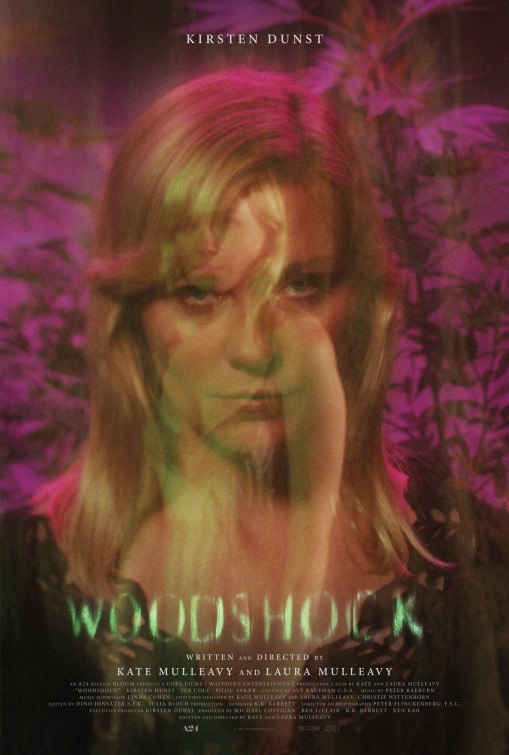 by Chris Feil
by Chris Feil
“Remember when we used to play in the woods together?” Woodshock begins in dreamy, creepy breathiness. That breathy quality carries throughout the entire film, a curious debut from Kate and Laura Mulleavy (otherwise known as fashion wunderkinds Rodarte). The film itself plays in the woods, a little bit touched with mystical wonder and a little bit okay with getting lost. It’s kind of like having Alice recount her trip down the rabbit hole while coming down from some serious Wonderland substances, but without getting to witness the magical land yourself.
Kirsten Dunst plays Theresa, a young woman grieving the loss of her mother while experimenting with drugs that heighten her sense of paranoia and dissociative feelings. The film diffuses us into Theresa’s state of being rather than illuminating much of who she is or what she might be thinking. Its placid flourishes give a rather vivid sense of what she’s going through, but can only go so deep into our consciousness without a broader sense of character. Ultimately, its Dunst that gets the shortest straw in this thoroughly stylistic effort unexpectedly detached from its lead performer.
But the film is more interesting than some of its mean-spirited dismissals will undoubtably suggest. Even if the Mulleavys don’t quite embrace the limitations of their approach, they deliver on a unique point of view with a distinct eye for transfixing imagery. It’s an evasively gorgeous film, perhaps as thin as the main character as far as what is on the page - perhaps the exercise in embodying Theresa’s herbal coping paints the Mulleavys vision into narrative numbness, but the debut attempt is respectable in its earnestness.

Inertia is partly the point, even as Woodshock frustrates and succeeds in mostly pieces rather than the whole. The film crafts a spiritual lull as it becomes increasingly paranoid and expressive, making for one toxic trip of emotionally remote filmmaking. Hey I’ve never been high, but Woodshock sure gave me an idea of what it feels like. For that, the Mulleavys prove to have some fascinating experiential ambitions as emerging filmmakers.
Don’t expect moments of extremity in this anxious, drug-fueled chamber piece - even if it’s evident influences are among Lynch and Ramsey, consider more those filmmakers subdued stretches. It’s a lovely and light trifle, worthwhile for its interests even if it is significantly limited (or more of a roach than a blunt, I guess). It won’t shake up the filmic landscape, but its daze makes for a uniquely engaging peculiarity.
Grade: C/C+